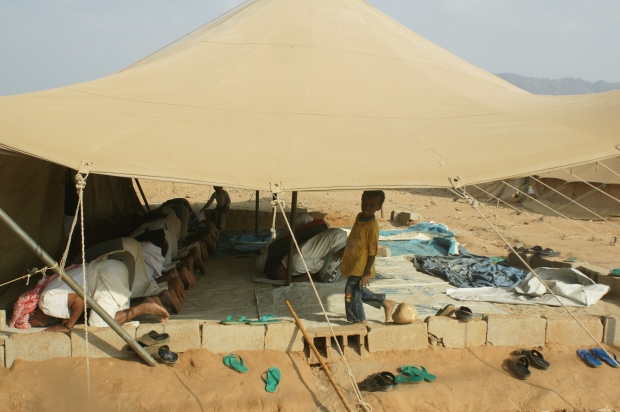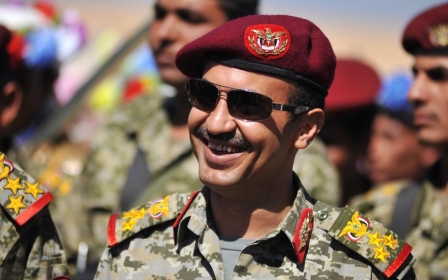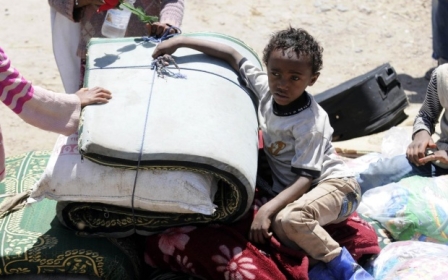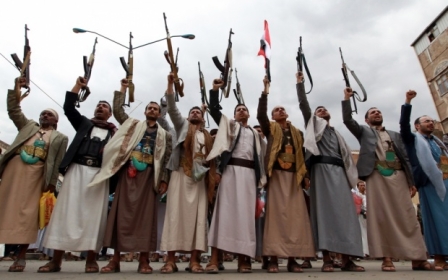Air raid on camp for displaced Yemenis kills at least 40
Airstrikes on a UN-administered camp in north Yemen housing thousands of displaced Yemenis killed at least 40 people on Wednesday and wounded more than 200, according to a local journalist and the International Organisation for Migration (IOM).
The bombing of Mazrak camp, close to Yemen’s border with Saudi Arabia, came on the fifth day of an aerial campaign by a Saudi-led coalition of warplanes seeking to halt fighters of the Houthi movement, who have seized much of the impoverished country.
“There were three airstrikes,” said Esa al-Rajah, a Yemeni journalist on the ground who arrived at Mazrak camp shortly after the explosion.
“The first destroyed a bridge, the second hit the gate of the camp and the third hit a health centre. Most of the people killed died in the health centre."
Al-Rajah said the streets near the camp were stained with blood, and covered in rubble and shrapnel from the rockets. He said women and children were among the dead.
“People were trying to flee the area but they have nothing. The nearest hospital is 30 kilometres away. Today there is no safe place in Yemen,” he said.
A Yemeni military official in Sanaa said that the fighter jets that hit the camp may have been trying to target a nearby army base controlled by Houthi fighters.
Yemen’s foreign minister, Riyadh Yassin, denied the camp had been hit by the Saudi-led coalition and blamed the “explosion at the camp” on “Houthi artillery".
Saudi officials have described their campaign against the Houthis – a Zaydi Shiite group that took part in the 2011 uprising against former president Ali Abdullah Saleh – as "surgical," saying it is directed at the rebel groups’ military hardware and infrastructure.
But the airstrikes launched last week with the backing of most Arab states have killed and injured numerous civilians, raising questions about the ability of the oil-rich kingdom to defeat the Houthis, a guerrilla group that often moves amongst civilians.
“Most of the Houthi militias now are in civilian clothes,” a Yemeni aid worker in Sanaa, who did not wish to be named, told Middle East Eye.
“The military camps the Houthis control are found throughout the city, often close to heavily populated areas. There is no bombing army bases in Sanaa without killing civilians,” said the aid worker.
Situated amidst the tough, mountainous scrubland of north-western Yemen, Mazraq camp houses around 5,000 people displaced by a six-year civil war between government forces and the Houthis that centred on neighbouring Saada province and ended in 2010. Many of Mazraq’s residents live in tents and suffer from severe malnourishment.
Around one third of the population in Saada fled their homes during the 2004-10 conflict, which is largely unheard of in the West. Families who fled to the camp from the north to escape the fighting have memories of aerial bombardments and the widespread use of child soldiers.
The journalist, al-Rajah, said that those who had been forced to flee to Mazrak camp were now under attack again.
"Those people are very poor... they have become victims of war for a second time."
Also on Monday, at least 13 civilians were killed in artillery shelling by Houthi militants in the southern city of Aden, the Anadolu Agency (AA) reported.
"Thirteen civilians were killed in Houthi artillery shelling of two districts in Aden," a medical source told AA.
Additionally, a number of civilians were injured in clashes between local fighters and Houthi militants in northern Aden.
Meanwhile, seven Houthi fighters were killed by local militant groups loyal to Yemeni President Abd Rabbuh Mansour Hadi, AA reported.
New MEE newsletter: Jerusalem Dispatch
Sign up to get the latest insights and analysis on Israel-Palestine, alongside Turkey Unpacked and other MEE newsletters
Middle East Eye delivers independent and unrivalled coverage and analysis of the Middle East, North Africa and beyond. To learn more about republishing this content and the associated fees, please fill out this form. More about MEE can be found here.





